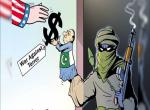Text of the article sent to Hindustan Times – Published in Hindustan Times on 16 April 2006 under the caption “We have not kept terrorists on the run”
One wrong way to assess terrorist incidents is to evaluate its gravity and import merely in terms of persons killed and injured. Considering the quantum of main charge, ingredients of the improvised device, place where it was kept, etc., it is evident that the terrorists did not intend to cause any serious damage to the life and property inside Jama Masjid. The objective apparently, was to incite the congregation who had assembled there for namaz of ‘Asar’ in large number, being a Friday and a public holiday. They would have liked them to come out of Matia Mahal gate with cries of ‘Allahu Akbar’ and ‘Islam is in danger’. They would have been joined on the streets of walled city by hundreds of others who at any point of time can be found aimlessly loitering around the Masjid, joining anything that is exciting. Their failure to invoke this response is a matter of satisfaction and augers well for communal harmony in the country. The self restrain exercised by the Hindus during the attack on Sankat Mochan Temple in Varanasi where, of course, the explosions were much more severe and casualties much larger, was a good precedent.
There is, however, another equally serious side of the problem. The terrorists strike anywhere, anytime and against any target is a myth. Had that been so, they would have caused havoc not only in India but rest of the world. The terrorist strikes take place when their intentions and capabilities meet the opportunity. The success or failure of a counter terrorist strategy lies in degrading their capabilities, forcing them to change their intentions and denying them the opportunity to strike. Events in recent months indicate our losing ground on all these counts. Terrorists are demonstrating their capability to take on targets from Kashmir to Karnataka and Sankat Mochan to Jama Masjid. To operate in such wide areas and against such diverse targets necessitate local network for logistic support, sources for procuring, transporting and storing explosives, secure communications, gathering of operational intelligence and the manpower to execute the job. Only fortified with these capabilities they can strike at the intended target. The fact that increasingly local ingredients are being used for fabricating Improvised Explosive Devises is another indicator of their enhanced capabilities and not a matter of comfort that there is decreasing use of ordinance grade explosives likes RDX, Semtex, PETCN, etc.
Degradation of capability essentially has to be an intelligence driven activity which should include busting of terrorist modules, neutralization of networks of financers, gun runners, over-ground supporters, etc. Proactive operations to neutralize ‘critical operators’ is also essential to blunt their striking capability. Under no security arrangement the entire country can be placed under a constant scanner to ensure that no incident takes place. We have to prevent it by keeping them on the run which apparently at present they are not – or at least to the degree required.
Changing intentions is a much more complex and multidimensional exercise. In addition to efforts of the security agencies it involves political action, legislative initiatives, diplomatic effort etc. The situation on this count has become more complex as international environment, neighborhood factor, internal vote bank politics, etc. all have an impact on the motivation and intention factor. The ISI, and Islamic groups patronized by them, still pursue what they consider as unfinished agenda of the partition. Similarly, the illegal Bangladeshi immigrants advocating the concept of lebensraum or living space militates against our security interest. The only way to change intentions can be to increase the cost for the adversaries for such misadventures. Unless convinced that bleeding India can jeopardize their own safety and security, they are unlikely to abandon this cost effective option against their asymmetric adversary. Withdrawal of POTA was a wrong initiative. At a time when the entire world is strengthening laws against terrorism, India the single larges sufferer of terrorist depredations abandoned the law which had psychological pressure on the terrorists and their over-ground supporters. The withdrawal has helped embolden them.
The area where the Indian security system has consistently proved its excellence is denying terrorists the opportunity to strike. India’s defensive security mechanism has by and large been commendable and while each incident of terrorist strike makes a big story, large number of incidents averted are probably known to very few. With all their intentions and capabilities, we have denied to the terrorists opportunities to strike at most of their sought after targets. Events in recent months, however, give indication of a slide back. Delhi’s walled city has always been an area where security agencies have maintained very high vigil for suspected persons and it was this sustained effort that made the terrorists, saboteurs, spies, etc. to avoid these areas. Pak ISI had often advised their agents not to visit the walled city. The fact that they have started considering it again as a safe area is a matter of concern. The vigil need to be increased.
Of late, the brand names like Lashkar-e Taiba, Jaish-e Mohammad, Harakat-ul Jehadi Islami, etc, have become less relevant in relation to actual perpetration of terrorist incidents. While these outfits are involved in planning, financing, procurement of materials, etc. they are outsourcing real execution of tasks to unknown youth with very tenuous links with these organizations. In this task, the illegal diaspora of Bangladeshis in the country is providing a big human resource to these tanzeems. Most of these Bangladeshi youth have been exposed to influence of radical Islam in their home country and have a strong anti-India mindset. For reasons of ideology or money, or both, they have no compunction in indulging in acts of terrorism and criminality. After the incident they find it easy either to escape to Bangladesh or melt away in the ever expanding ocean of illegal immigrants. Their being too widely scattered in different parts of the country with total freedom of movement within the country is going to make large areas vulnerable to terrorist attacks. It is unfortunate that they are able to leverage their voting strength to mobilize political support.
On the face of it the blasts in Jama Masjid are unlikely to be the handiwork of Indian Muslims. It is only the Muslim from outside who will calculate that an event like this will lead to a communal divide and possibly communal violence. In the interest of India’s larger security interest, it will be necessary for the police to take stern action against the outsiders and keep a close watch on them. The government should also seriously consider reviving the scheme of issue of national identity cards which was initiated in 2002 but of late has been relegated to cold storage. The scheme needs to be implemented under a time bound programme if we have to deny outsiders a free run to meddle with our internal security.









Post new comment